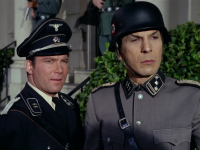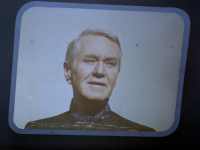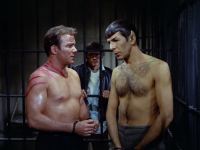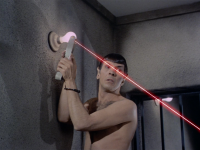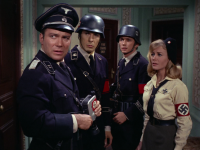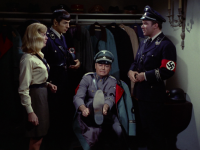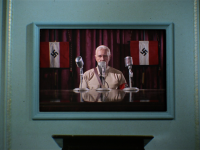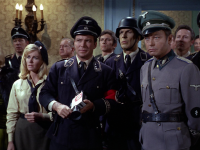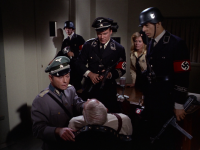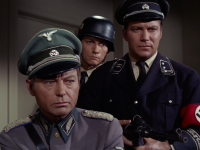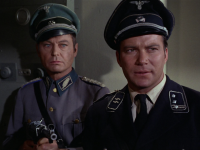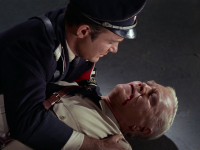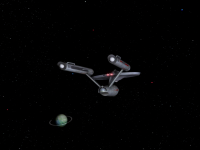Star Trek: The Original Series — 2x21 — Patterns of Force
Synopsis
Enterprise is sent to planet Ekos to investigate a disappearance of Federation historian John Gill.
Filler rating: good filler
There's no essential plot or exposition in this episode that renders it unskippable, but it's a decent episode, even though it could have been better.
Remarkable scenes
- The Enterprise blowing up a nuclear warhead launched at them from the planet.
- I like the subdermal transponder idea. A good precaution after so many away missions when they lose their communicators.
- Kirk: "You look quite well for a man who's been utterly destroyed, Mr. Spock."
- Kirk, regarding Spock in a Nazi uniform: "That helmet covers a multitude of sins!"
- Spock to Kirk: "You should make a very convincing Nazi."
- Spock digging the transponder out of Kirk's arm. Ouch!
- Kirk bemoaning about holding Spock up on his back.
- Daras: "You mean that the Führer is an alien?" Yeah, hard to tell sometimes, isn't it? ;)
- Kirk regarding McCoy's difficulties with the uniform: "Well send him down naked if you have to!"
- Spock being called a member of "an inferior race."
- Gill: "Even historians fail to learn from history. They repeat the same mistakes."
Review
An episode which seems to run on little more than the assumption that Nazis on TV makes for good drama. Sadly, that's not entirely the case here, but despite the episode's weakly substantiated, mostly tacky premise which is little more than an excuse to fill the screen with somewhat bastardized World War II imagery, this episode manages to still retain some entertainment value.
The entire story is predicated on the idea that John Gill, an historian from Earth, had become so fascinated with Nazi Germany and so disturbed by the conflict between the primitive civilizations of Ekos and Zeon that he decided to violate the Prime Directive and interfere with their conflict by manipulating Ekos into adopting the characteristics of Nazi Germany on the grounds that Nazi Germany was, in both John Gill's and even more oddly Spock's peculiar judgement, Earth's "most efficient state" in history.
This is a remarkably stupid idea on a number of levels. Even accepting the premise that Nazi Germany was somehow blazingly efficient, which seems like an unlikely conclusion for either today's historians or the Federation's, it's hard to imagine that John Gill could ignore the painfully obvious fact that this hypothetical efficiency came at the cost of startling totalitarian brutality. Worse yet, if John Gill's goal was to end Ekos' conflict with Zeon, then why transform Ekos into a society perhaps most famous for its intolerance of outsiders? Hardly a way to foster peace. And I have a hard time imagining how Ekos transformed in such a way could ever be run "benignly."
Nevertheless, these seemingly stunning errors in plot logic are confined entirely within the thinking of the character of John Gill, who even acknowledges his gravely poor judgement in his final words. As such, instead of flawed plot logic, we are left merely with a flawed character subscribing to ridiculously faulty reasoning, which greatly enhances the realism of the plot itself, though at the expense of most of John Gill's authenticity. Even with John Gill being established as flawed in his thinking, it's almost hard to believe anyone in his position could have been that stupid.
Another curious detail was the statement that John Gill's view of history was unusual in that he subscribed to a concept that history is best viewed as a series of causes and motivations rather than dates and events. What struck me as odd about that statement is that this deterministic view of history doesn't strike me as at all unusual even today. By the Federation's time period, I would suspect that this reading of history would be rather common.
The plot logic itself is not immune to critique either. Since both Ekos and Zeon are yet another pair of planets full of aliens which look exactly like humans, I question the wisdom of bringing Spock down to the surface in what is supposed to be an undercover mission shortly after the ship was attacked by a nuclear weapon launched by these people. While Spock's headgear did indeed "cover a multitude of sins," the episode itself seemed to laugh at this cliche by having Kirk and Spock end up being captured early on entirely due to the removal of Spock's helmet.
Likewise, the plot logic surrounding the transponders was pretty fuzzy too. The reason Kirk and Spock were given transponders was so that the Enterprise could beam them up if they got into trouble. But then the first thing they do once they get into trouble is remove the transponders to stage a risky escape attempt! Why not just wait for the Enterprise to beam them up? I suppose that it's possible the next check-in from the ship was not scheduled soon enough to prevent their execution, but even assuming that, the policy surrounding check-ins should be more regular specifically to counteract that problem. That, and it sure was nice of the guards to wait outside and completely out of view to give Kirk and Spock ample time to stage a complex escape.
All that said, as we've seen from similar episodes, this could have been far worse. As was mentioned before, the core issue with the plot logic was confined to the judgment of John Gill rather than the plot logic itself, unlike what was the case with Miri and similar stories. Likewise, the fact that the social sciences have advanced to such a degree that it is even possible for John Gill to subtly and carefully alter a society of people to produce an identical clone of Nazism is a fascinating idea; far more compelling than Miri's pathetic excuse of the planet just so happening to have randomly evolved identically.
The premise being what it is also enables us to watch Kirk take far too well to pretending to be a Nazi. He takes to the role quite naturally, making up all kinds of wonderful hate lines about good hunting, dumping corpses outside due to overflow, captured pigs, and so forth. I also quite enjoyed the bizarrely out of character yet nevertheless amusing scene where Spock expresses excitement regarding the exhilarating effect the gamble of whether or not their plan will work has on him. I suppose it's nice to see Spock unable to control his human side on occasion. Finally I quite enjoyed the clever use of the Vulcan mind meld to manipulate comatose John Gill. All things considered, I would have to characterize this as a remarkably well executed story given its mostly shoddy premise.
